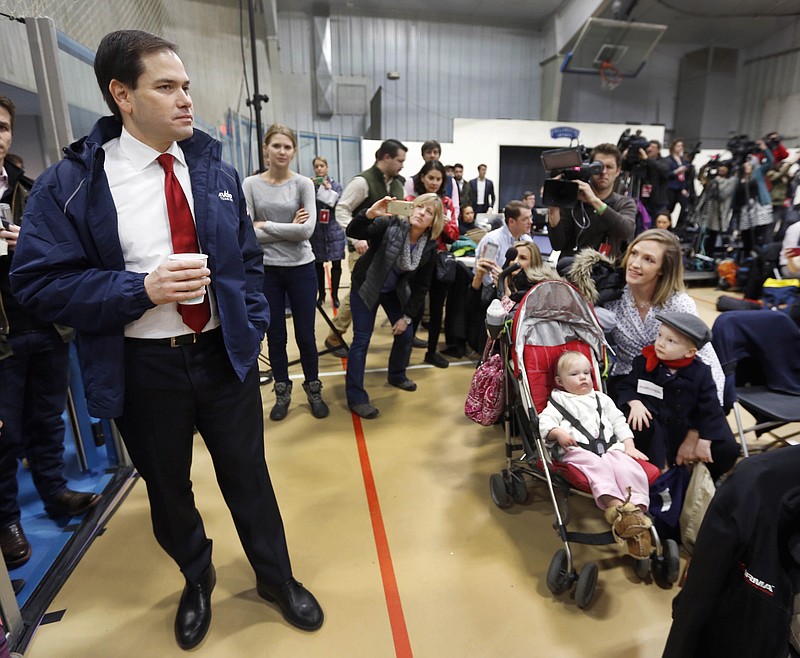Here we are, in the Marco Rubio Moment.
The Republican establishment is thrilled: A moderate-sounding Gen X senator from a swing state! And one so good at spin he managed to give a victory speech in Iowa after he came in third.
Christie, pressing further - and when does Chris Christie not? - has also been saying that the speech Rubio sticks to is the same one he's been giving since 2010. You do get the feeling you're supposed to vote for him because his dad and mom believed in the American dream.
As a young man, Rubio himself was not particularly hard working. But he did sympathize with his parents' struggles, and when his father, a bartender, went on strike in 1984, young Marco became "a committed union activist."
And then - American dream! - the bartender's son became a senator, who opposes raising the minimum wage and wants to eliminate "rules that empower unions." You know, you grow.
Rubio was a slow starter, education-wise, but he eventually graduated from law school, saddled with a load of student debt. This is, as he always points out, a familiar American story. The next part, where he instantly runs for office and acquires a billionaire benefactor who helps him out by underwriting low-stress jobs for Rubio and his wife, is slightly less average.
The $800,000 advance he got for his memoir - the one that fails to explain his trajectory on the union issue - is also not exactly typical. But he's been a terrible money manager, which he explains by saying that "I didn't inherit any money."
On the issues, Rubio says he has a new generation's answers to the nation's economic problems. The answers are mainly about reducing business taxes and regulations, but he says it in a much more youthful way.
Then there's the great Immigration Switcheroo. Follow the timeline:
2010 - Running for the U.S. Senate, Rubio is against giving people who are in the country without documentation any path to citizenship. That's "amnesty," and it's just wrong, like failing to enforce the speed limit.
2013 - Marco is a senator, and he's totally changed his mind about that path-to-citizenship matter. Why do you think that happened? Uncharitable observers thought he wanted to cozy up to big Republican donors who like the idea. But maybe he was just growing.
He becomes one of the famous bipartisan "Gang of Eight" pushing for immigration reform. Rubio is a valuable partner for the Gang, and he makes them pay with repeated concessions, including a very strong provision for additional border security. Finally, the path-to-citizenship bill passes the Senate 68-32. "We are a compassionate people," he says on the Senate floor.
2013 - Fast forward a few weeks. The Tea Party is enraged, the House is unenthusiastic and Rubio is backtracking wildly. "Look," he tells Fox News, "it's not the most important issue facing America. Obamacare is more important, for example."
2015 -Marco Rubio is a candidate for president. He hates "amnesty." And he says you can't have immigration reform until you have additional border security.
In the competition with the other super-conservative Cuban-American contender, Ted Cruz, Rubio is regarded as more likable. This is not a heavy lift. He is also competing with Cruz for the affection of Christian conservatives, and while Rubio has always mentioned God in his political speeches, lately he's been ramping things up. One of his ads in Iowa was about "the free gift of salvation offered to us by Jesus Christ."
Rubio himself goes to two churches. Sometimes the family attends a Baptist-affiliated service on Saturday night and a Catholic Mass on Sunday.
Quick question: How would you feel about a presidential candidate who's both Protestant and Catholic?
A) That's great. Maybe it's a sign he's open-minded. B) That's OK, unless it's just another way to fudge his positions. C) I am strongly against bringing a person's religion into the political arena. Which is why I wish Marco Rubio would stop telling us about his.
The New York Times
